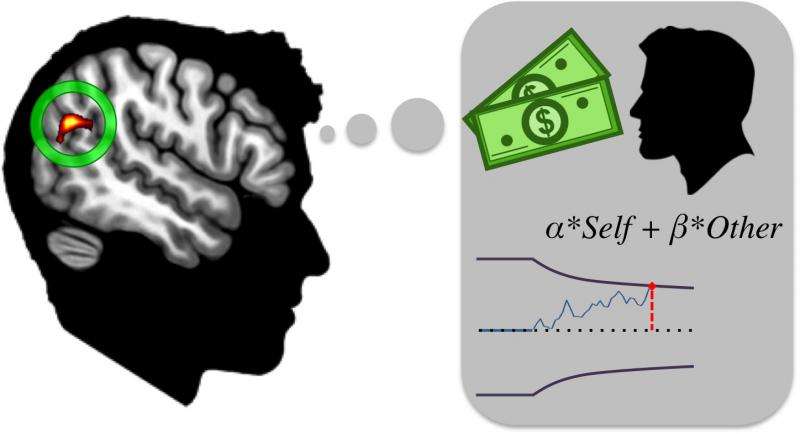Researchers find that a simple computational model of altruism, where specific brain regions represent other's needs, can predict when people are generous and why generosity sometimes feels so difficult. Credit: Cendri Hutcherson
A new computational model of how the brain makes altruistic choices is able to predict when a person will act generously in a scenario involving the sacrifice of money. The work, led by California Institute of Technology scientists and, appearing July 15 in the journal Neuron, also helps explain why being generous sometimes feels so difficult.
The reason people act altruistically is well contested among academics. Some argue that people are innately selfish and the only way to override our greedy tendencies is to exercise self-control. Others are more positive, believing that humans naturally find generosity rewarding and that we only act selfishly when we pause to think about it. The Caltech model suggests that neither side fits all; both generosity and selfishness can be fast and effortless. But it depends on the person and the context.
"We take a very simple model of choice that's been developed for predicting perceptual decisions—like whether a dot is moving left or right—and adapt it to capture generosity," says lead author Cendri Hutcherson, who did the work as a postdoctoral fellow at the California Institute of Technology and now directs the Decision Neuroscience Lab at the University of Toronto. "With this simple model, we are able to explain a huge host of previously confusing patterns about how people make altruistic choices."
"We find that what matters is not whether you can exert self-control, but simply how strongly you consider others' needs relative to your own," she says. "If you consider the other person's needs more, being generous feels easy. If you consider yourself more, generosity requires a lot of effort."
Hutcherson also thinks the model sheds light on debates about whether the mere act of behaving generously is rewarding. "Researchers have observed that if you act generously then you see greater activity in areas of the brain that represent reward value, and so have concluded that generosity is an inherently rewarding act—but our model actually suggests that you can get that activity just because of the way these regions construct a decision," she says. "You would see more activation in reward areas simply because the decision is complex and so requires more processing to make."
The model is based on brain scans of 51 males as they made decisions in a modified version of the "Dictator Game." To play this game, each participant was paired up with a stranger he would never meet and asked whether he would be willing to sacrifice different amounts so that the stranger could get a significantly larger pay-out (e.g., lose $25 and the other person receives an extra $100). The money was real and each participant had to make a total of 180 decisions.
The brain scans suggested that different brain areas represent one's own and others' interests. Self-oriented values correlated with activity in the ventral striatum, an area linked to basic reward processing. Other-oriented values correlated with activation of the temporoparietal junction, which has been implicated in empathy. Hutcherson believes this is evidence that people are more likely to give away resources if they already have in mind how their donation will benefit someone else.
Perhaps unsurprisingly, most people tended to be greedy, but the model also explains another puzzle: sometimes even the most selfish participants at times made generous decisions. The researchers see these choices not as evidence of self-control, as previously thought, but simply mistakes, a moment in which the benefit for the self was accidently underweighted. These errors suggest that time pressure could be one way to get people to behave out-of-character of their normal giving behaviors, but this is likely not a successful long-term strategy for fundraising.
"Our results indicate that people are happier when mistaken generosity doesn't happen." Hutcherson says. "But if we can increase people's focus on the thoughts and experiences of others, we can decrease those mistakes while increasing charitable giving and making altruism feel a lot easier."
More information: Neuron, Hutcherson et al.: "A Neurocomputational Model of Altruistic Choice and Its Implications" dx.doi.org/10.1016/j.neuron.2015.06.031
Journal information: Neuron
Provided by Cell Press






















